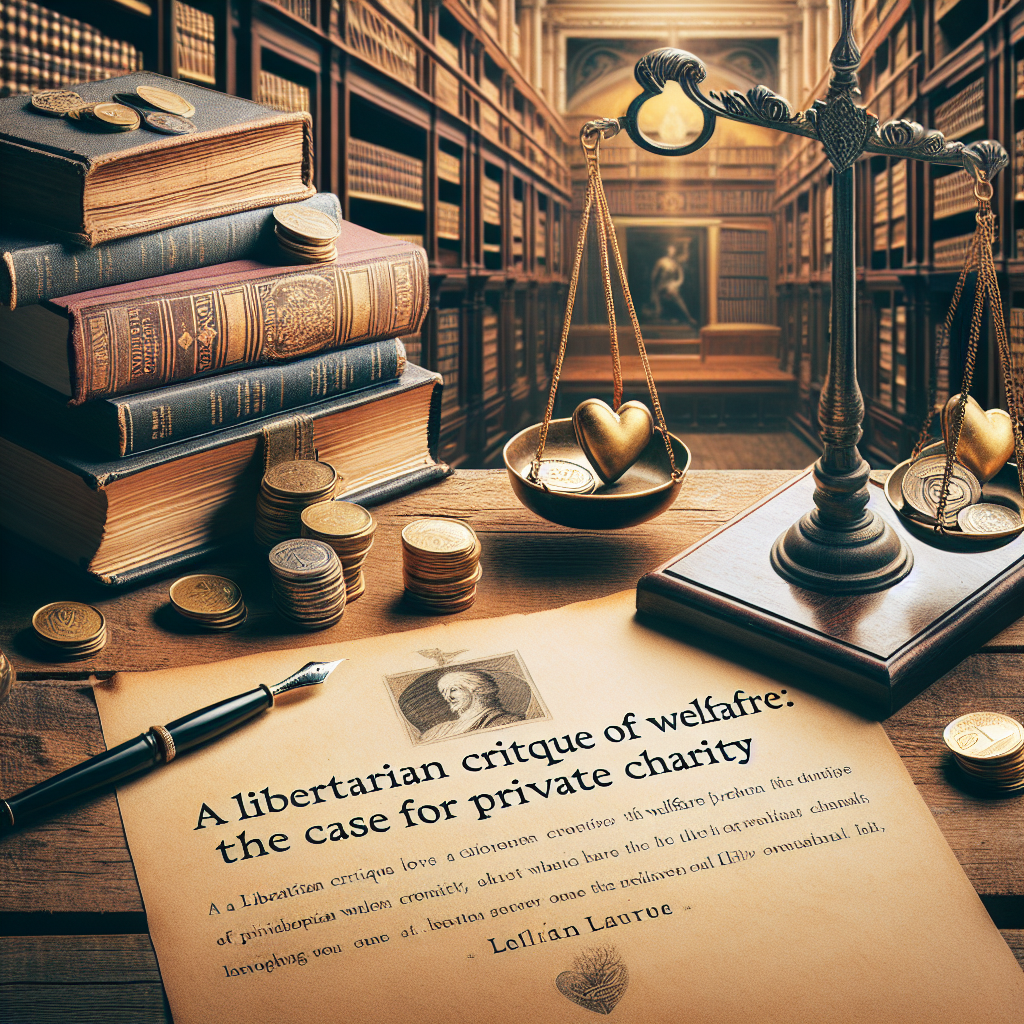A Libertarian Critique of Welfare: The Case for Private Charity
Welfare programs have long been a topic of debate in political discourse, especially among libertarians. While proponents argue that government assistance is essential for the most vulnerable members of society, libertarians offer a critical perspective that advocates for private charity over state welfare. In this article, we explore the libertarian critique of welfare and present the case for private charity as a more effective and morally sound solution.
Understanding the Libertarian Perspective on Welfare
Libertarians champion individual liberty and minimal government intervention in personal and economic affairs. They assert that welfare programs often lead to government overreach, dependency, and inefficiency. Key criticisms include:
-
Infringement on Personal Freedom: Welfare programs are funded through taxation, which many libertarians argue constitutes a violation of individual property rights. They argue that individuals ought to have the freedom to choose how to allocate their finances, rather than having a portion taken by the state.
-
Creation of Dependency: Critics argue that welfare can create a culture of dependency where individuals rely on government aid instead of seeking self-sufficiency. This dependency can undermine personal initiative, creativity, and entrepreneurial spirit.
- Misallocation of Resources: Libertarians contend that government programs often misallocate resources due to bureaucratic inefficiencies. They argue that a lack of personal accountability and market discipline results in waste and ineffective use of funds.
The Role of Private Charity in Alleviating Poverty
Instead of government-provided welfare, libertarians argue for private charity as a more effective means of addressing the needs of the poor. Key advantages of private charity include:
1. Targeted Assistance
Private charities often provide tailored support based on specific community needs. Unlike one-size-fits-all government welfare programs, charities can adapt their services to meet the unique requirements of their beneficiaries. This personalized approach leads to more effective outcomes and higher levels of satisfaction.
2. Promoting Volunteerism and Community Engagement
Private charity fosters a culture of giving and community involvement. When individuals and organizations rally together to support those in need, communities strengthen their bonds and networks, leading to enhanced social cohesion. Volunteer work also instills a sense of purpose and accomplishment in participants, fostering goodwill and empathy.
3. Encouragement of Self-Sufficiency
Many charitable organizations prioritize programs that promote self-sufficiency. By providing education, job training, and skills development, private charities empower individuals to lift themselves out of poverty. This approach advocates for long-term solutions rather than temporary relief.
Examples of Effective Private Charities
In recent years, several private organizations have emerged as successful models of charitable giving that align with libertarian principles. Some notable examples include:
-
DonorsChoose: This platform allows teachers to post specific needs for their classrooms, empowering individuals to donate directly to projects they believe in, fostering a more educated society.
-
Habitat for Humanity: This nonprofit organization builds affordable housing with the help of volunteers and future homeowners, promoting self-reliance and community engagement.
- Feeding America: This network of food banks and local agencies addresses hunger and food insecurity through grassroots efforts and community involvement, emphasizing the importance of direct action.
The Limitations of Government Welfare Programs
To further illustrate the libertarian position, we must analyze some key limitations of government welfare systems:
1. Administrative Overhead
Government welfare programs often have high administrative costs that divert funds away from direct assistance. According to various studies, a significant portion of welfare expenditures goes toward bureaucracy rather than directly helping those in need.
2. Stigmatization of Recipients
Recipients of government welfare may face societal stigma and moral judgment, leading to feelings of shame and inferiority. Private charitable efforts tend to promote dignity and respect for all individuals, focusing on personal stories rather than reducing people to mere statistics.
3. Inflexibility and Bureaucracy
Government programs are often slow to adapt to changing circumstances, while private charities possess the agility to pivot quickly to meet emerging needs. This flexibility allows them to implement effective, timely solutions in a dynamic environment.
Conclusion: A Libertarian Blueprint for Charity and Community Support
The libertarian critique of welfare highlights important insights about individual freedom, personal accountability, and the limitations of bureaucratic systems. While welfare programs may be well-intentioned, they often foster dependency and inefficiency. In contrast, private charity embodies the principles of voluntary giving, community focus, and the promotion of self-sufficiency.
In an era where many seek to address poverty and social inequities, libertarians advocate for a return to grassroots solutions—those that invigorate community spirit and empower individuals to thrive. By investing in private charitable initiatives, society can create a more sustainable and compassionate approach to helping those in need, rooted in the values of liberty and personal responsibility.
Share this content:












Post Comment